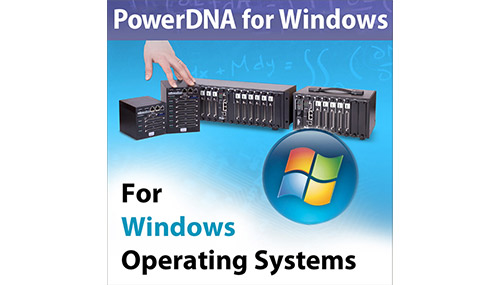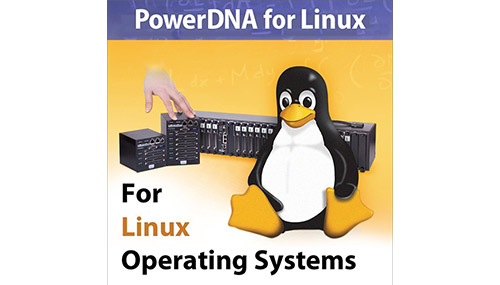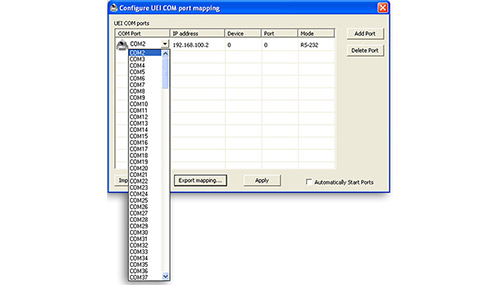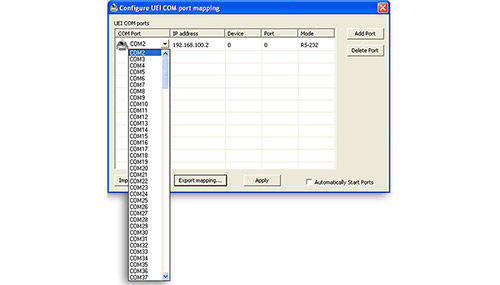PowerDNA for QNX drivers/SDK
Version # 5.0.0.6
UEI Europe Office
+49 40 63698136
Email EU Sales
General
(508) 921-4600
Email Sales
Email Support
Click here for local offices and distributors.
If you have a Cube, Rack or MIL package running PowerDNA back to a host, this section is for you. One of the great advantages of UEI’s software is that the same API supports all operating systems. Do you build applications in both Windows and Linux? No problem, learn the API on one platform and you’ll know it for the other. Want to develop in Linux but deploy in VxWorks? Again, it’s no problem. The API is the same.
Windows users can also take advantage of an even higher-level API provided by the UEIDAQ Framework. It offers a simple, high level programming platform with API that supports all popular Windows programming languages. The UEIDAQ Framework also supplies complete support for those creating applications in off-the-shelf data acquisition and control packages, including LabVIEW, MATLAB/Simulink, as well as any application, which supports ActiveX or OPC servers.
UEIDAQ Framework library uses the same API to access any devices from UEI's Distributed Ethernet I/O families. Using UEIDAQ Framework library dramatically cuts the amount of code needed to perform data-acq and control tasks.
The UEIDAQ Framework library comes with bindings for all major programming languages and data acquisition / test programming environments including CC++, C#VB.NET as well as Excel,OPC, MATLAB, TestPoint, Agilent VEE, LabVIEW for WindowsLab, Windows/CVI.
The UEIDAQ Framework library is a part the Software Suite that ships on CD with every unit at no charge.
UEI offers extensive Linux drivers/support for both Cube and RACK Chassis in PowerDNA mode where the program runs on the PC.
These are factory developed and supported drivers. Though many DAQ firms have ignored the Linux market, or relegated their support to unofficial user forums, UEI provides complete drivers for their data-acquisition hardware, including factory support. All Linux drivers are included with the product and are available for download on our web site.
UEI's work with Linux as a data acquisition and control platform doesn't end with well-supported driver software however, UEI has also based it's very popular UEIPAC programmable automation controllers on the Linux OS. The UEIPAC boots as a standalone system where the program runs under Linux, Xenomai extensions to Linux or even VxWorks if you order that configuration.
UEI’s remote serial server (UEI-RSS) software makes UEI’s popular line of PowerDNx DNx-SL-501 and DNx-SL-508 devices accessible as standard Windows or Linux serial ports. The serial server allows up to 255 serial ports to be controlled by a single PC over a single Ethernet port. UEI-RSS not only allows users to expand the number of standard serial ports available on a single PC, it also allows these ports to be mounted remotely. Using UEI’s standard chassis, the ports may be located up to 100 meters from the host; while using fiber interface chassis, the serial ports may be up to 20 km from the host. The UEI-RSS Serial Server is included with the purchase of UEI’s DNx-SL-501 and DNx-SL-508 devices.
Setting up and operating the UEI-RSS is quick and easy. Users install the application, assign devices to ports, and save configurations in a matter of minutes. A status window displays each port’s status and incoming/outgoing traffic. Status for each port is updated once a second. The UEI-RSS runs as standard communications ports in Windows XP, Windows Vista, Windows 7 (32- and 64-bit), 8, 10, and Linux.
UEI’s I/O and VxWorks create a modern, powerful real-time DAQ and Control system.
Whether replacing a legacy VME system or designing a new one, your fully COTS UEI system is smaller, more rugged and less expensive than VME or other I/O technologies. Our systems can be configured to run VxWorks on your host PC or standalone on UEI’s Cube or RACKtangle chassis. With over 60 I/O boards UEI’s sure to have the I/O you need, and our 10-year availability guarantee ensures long term support while preserving your investment in VxWorks technology.
Among the standalone commercial RTOSs, QNX has established itself as a major brand name and enjoys great popularity in a wide array of data acquisition and control applications. Thus, it was an easy decision for UEI to write drivers that work specifically with that environment
UEI's support for QNX takes a special form due to that OS's architecture. The QNX SDK includes all definition files and libraries you need to link into an application. Further, you get startup code, as well as example programs with C source code that illustrate both software-clocked and hardware-paced analog inputs.
Implementing a QNX driver is different than working with Windows or Linux drivers. QNX allows applications with root privileges to directly access PCI bus addresses and resources including interrupts. Thus the driver contains no read()/write()/ioctl() routines. We've implemented the PowerDAQ/DNA for QNX data acquisition and control driver as a library to link with user back-end applications (server).
Your application runs as a regular Linux process giving you access to the standard POSIX API provided by the GNU C runtime library (glibc) as well as any other library that can be compiled for Linux (for example: libxml, libaudiofile…).
You may now take advantage of all the hardware advantages of UEI’s popular UEIPAC chassis and continue to develop your applications in VxWorks. This powerful combination provides hard real-time performance, an extremely robust and reliable operating system, allows you to develop your application in a familiar environment and last, but not least, allows you to preserve a great deal of previously written code! To deploy a UEIPAC application running VxWorks you’ll need the following.
UEI PACHMI
The UEIPAC is an embedded system without any graphical capability. However, it is very good at network connectivity, which makes it possible to create remote graphical user interfaces (also known as HMI Human-Machine-Interface). Our shared data library eases data communication between a program running on UEIPAC and clients running on networked hosts through a simple C, .NET or JavaScript API. A graphical UI can be programmed on the client side using any language capable of calling functions exported by a C library. In addition, bindings are provided for the following languages: C#, VB.NET, python and LabVIEW. New advances in HTML standards are making it possible to create graphical user interfaces that run in a web browser on a host PC, tablet or smart-phone.
For more information, please contact support.
The UEIModbus™ cubes are compact, rugged, Ethernet-based data acquisition and control interface that communicates with a host computer or PLC over MODBUS TCP. Their flexibility allows you to configure one or more cubes to match the specific I/O requirements of your application. The UEIModbus is ideally suited for a wide variety of industrial monitoring and control applications.
The MODBUS messaging protocol was developed by Modicon in 1979 and is used to establish master-slave/client-server communication between intelligent devices. It is a defacto standard, truly open and the most widely used network protocol in the industrial manufacturing environment.
Two versions of the UEIModbus are available. The UEIModbus 300 provides slots for 3 I/O boards and is 4" x 4" x 4". For larger applications the UEIModbus provides 6 I/O slots in a slightly larger 4" x 4" x 5.8" cube.
Whether your application requires a few I/O channels or a few thousand, the UEIModbus 300 and 600 Cubes are an ideal solution in your MODBUS based application. The Cube’s unique combination of flexibility, compact size, mechanical and electrical ruggedness, and ease of use is unparalleled.
Contact support@ueidaq.com for further information.
The Experimental Physics and Industrial Control System (EPICS) is a software environment commonly used to develop distributed control systems for particle accelerators, telescopes and other large experiments. EPICS also provides supervisory control and data acquisition (SCADA) capabilities. The tool is designed to help develop systems that often feature large numbers of networked computers providing control and feedback.
EPICS uses client/server and publish/subscribe techniques to communicate between the various computers. One set of computers (the servers or input/output controllers), collects experiment and control data in real-time using the measurement instruments attached to it. This information is given to another set of computers (the clients) using the Channel Access (CA) network protocol. CA is a high bandwidth networking protocol, which is well suited for soft real-time applications such as scientific experiments.
The UEISIM offers Simulink users a new, powerful and flexible I/O target. Models built in Simulink are deployed directly on the UEISIM using Real-Time Workshop. The combination creates a powerful new solution in the creation and tuning of many real-time and non-real-time applications. These include simulation model verification, rapid prototyping, and hardware-in-the-loop testing. The UEISIM is rugged, flexible and expandable enough that it is not only a great solution while in your development cycle, it’s also the ideal solution for your production hardware.
To use the UEISIM simply: a) Build your Simulink application. b) Open MATLAB, and select Simulink/Embedded target for UEISIM. c) Convert your model to use the UEISIM I/O blocks (if you had not used them in your original model). d) Create an executable via Simulink Coder. e) Connect the UEISIM in "external mode" (if you wish to remotely monitor the application while running on the UEISIM). f) Start your simulation. Six easy steps and your simulation is running live on real hardware.
Contact support for more information.
UEI’s OPC-UA compatible I/O product family is designated the UEIOPC-UA series. It offers an unprecedented combination of flexibility, high performance, low cost, ruggedness and small size, all fully supported by your standard OPC-UA host (no windows host required). The OPC-UA functionality is available on all of UEI’s popular Cube and RACKtangle chassis.
UEIOPC-UA series supports the following profiles and facets: Server Profile: Embedded UA Server profile Transport Profile: UA-TCP, UA-SC, UA Binary Security Profiles: SecurityPolicy - Basic256Sha256, SecurityPolicy - Basic256 and SecurityPolicy – None Access Types: Data Access, Historical Data Access. System configuration is made easy by the UEIOPC-UA’s intuitive, easy to use web/HTML interface. The web interface also supports the OPC-UA Historian functionality.
OPC-UA systems are ideal solutions in a wide variety of measurement and control applications in industries such as Oil & Gas, Automotive, Energy Systems, Food & Beverage, Water Treatment, Chemical Processing and many more!
Contact support@ueidaq.com for OPC-UA drivers.
Applications that require only data logging are easily accomplished with our UEILogger -- without programming. This configuration provides one of the most compact, rugged, and high performance data loggers available. To get your system quickly up and running, first create your application on a high-level, intuitive GUI tool, which we provide for Windows platforms. Once your logging application is created, you download your application to the UEILogger, disconnect it from your PC and are free to place it in location. After the data is acquired, you either reconnect to your PC via Ethernet, or simply remove the SD card and read the data directly.
UEI provides comprehensive solutions for PCI and CompactPCI (PDXI) based systems. By using UEI PCI & PDXI boards (also known as PowerDAQ), programming your data acquisition and control system has never been easier.
PCI: Despite the emergence of alternate form factors for PC-based data acquisition, test, measurement and control boards that plug into PCI buses continue to remain popular. UEI has developed a line of board-level products that turn your PC into a powerful measurement and control system.
Our engineers have pushed the envelope when it comes to I/O at the board level. Highlights include:
PDXI: UEI's CompactPCI analog output boards supply as many as 32 independent 16-bit analog outputs on a C-sized card. Here you not only significantly increase the number of analog outputs, you also have 16 digital I/O lines and three counter/timers. With these functions, the PDXI-AO family is well suited to implement complex closed-loop systems, as well as handle motor control and many other industrial automation tasks.
The card calibrates each analog output individually without using trimpots and instead relies on a special D/A-based solution that stores calibration coefficients in a EEPROM and loads them automatically upon power up. This method also keeps board outputs in a predefined user-programmable state upon system startup.
The PDXI-AO boards provide an excellent means to add analog output capability to any CPCI/PXI based data acquisition and control application.

Version #5.2.0.10
Older versions, please contact support@ueidaq.com.

Version #5.2.0.10
Older versions, please contact support@ueidaq.com.

Version #5.2.0.10
Older versions, please contact support@ueidaq.com.

Version #5.2.0.10
Older versions, please contact support@ueidaq.com.

Version # 1.7.0

Version # 1.7.0